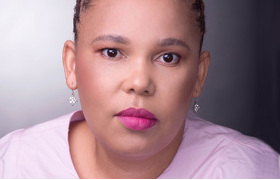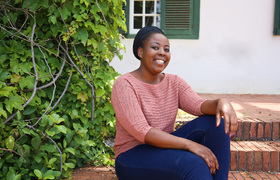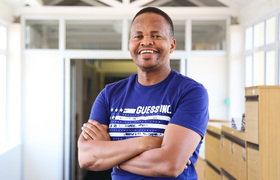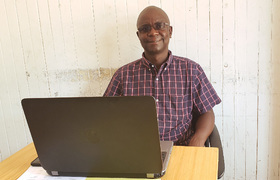Commitment, passion and dogged determination
12 December 2018 | Story Penny Haw. Photo Je’nine May. Read time 7 min.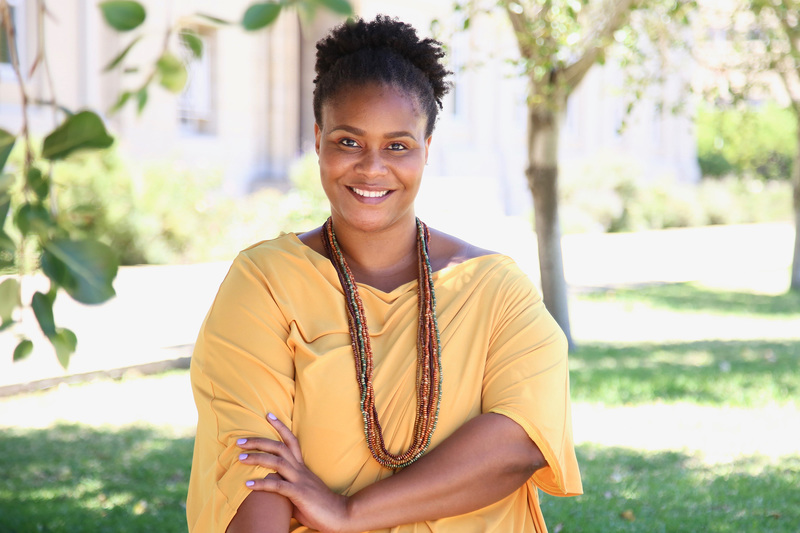
Driven by the reward of seeing the full picture when all the pieces of the puzzle are in place, Kehilwe Nakedi’s path to a PhD in Medical Biochemistry was characterised by “commitment and passion”. It’s no coincidence then that she believes these are vital ingredients of successful science.
“Good scientists are committed and passionate,” she said.
“Commitment is what keeps you going when it gets rough – and it is rough a lot of the time. Passion is what brings excitement when you get new data. It also keeps you from becoming jaded. And the two things are symbiotic.
“When, as a scientist, you are passionate, it becomes easier to commit and stay focused.”
Despite fantasising about being the one “to cure AIDS” from a very young age and having studied science throughout her schooling, as a teenager she wasn’t sure what kind of scientist she wanted to be.
After completing school at Kagisho Comprehensive Secondary in Bloemfontein, she thought she’d become a dietician. But when she applied too late for the course, a counsellor at the University of the Free State (UFS) recommended she register for a BSc instead.
“As a result, my path to a PhD in medical science involved a series of events and interactions with various mentors, during which I discovered unexpected passions that helped me grow into the scientist I realised I wanted to be,” Nakedi explained.
Financial hurdles and hoops
Having graduated from UFS with a Bachelor of Biological Sciences degree with majors in microbiology and food science, Nakedi undertook a BMedSc (Hons) followed by her masterʼs – both in medical microbiology – at the University of KwaZulu-Natal.
The research title of her masterʼs was “Measuring Changes in Gene Expression Profile within Two Weeks of Tuberculosis Treatment”. She began her PhD in Medical Biochemistry at UCT in 2013.
But, contrary to what the neatly presented line-up of qualifications on her curriculum vitae might suggest, Nakedi’s academic journey wasn’t always smooth sailing. There’s a clue to this when you examine the dates and note that 19 years stand between her starting her university career and completing her doctorate.
“The easiest thing about getting an education is the academic programme. That’s not an unexpected challenge,” she said.
“But, as most South African students will tell you, the challenges are the financial hurdles and hoops that one has to jump to get educated.
“It is extremely challenging to focus on excelling academically when you are worried about how you will pay rent and what you will have to do to not go to bed hungry. Unfortunately, these are challenges the majority of us face.”
“It is extremely challenging to focus on excelling academically when you are worried about how you will pay rent and what you will have to do to not go to bed hungry.”
Financial constraints meant Nakedi was compelled to stall her studies, find work and save before continuing. It was frustrating and required dogged determination, which included working as a research technologist for the South Africa Medical Research Council (SAMRC) in Durban to raise funds to pursue her postgraduate studies.
Support and encouragement
“I unwillingly took five years off to work in a non-scientific position – I had graduated with a BSc, but the university withheld my certificate because I had outstanding fees due to them, even though I was supported by NSFAS [the National Student Financial Aid Scheme] – so that I could save up enough money to register for an honours degree,” she said.
“It shouldn't be that difficult to get educated.”
Innate strength of mind and purpose notwithstanding, Nakedi acknowledged that she’s benefited from the support, encouragement and inspiration of others.
“Several people have influenced my career trajectory. The first one was my high school science teacher, Dr Diana Christov. She saw something in me, and encouraged and nurtured it,” she recalled.
“Then, years later, I decided I wanted to be a tuberculosis researcher after listening to Professor Valerie Mizrahi give a talk at a Tuberculosis Drug Discovery Conference in 2009. She doesn’t know it, but I’m actually at UCT because I was following her; I want to be just like her.
“There are many others. In fact, I have been privileged to work with the best scientists in their fields and they have inspired me in many ways.”
During the course of her PhD studies in the Department of Integrative Biomedical Sciences at UCT, Nakedi has published seven papers in top international journals in the field of proteomics (the study of proteins in genes) with a further first-author manuscript currently in preparation.
In addition, she was selected to give an oral presentation on her work at the International Conference on Analytical Proteomics (ICAP) in Portugal in 2017, and presented a poster on her research at the Gordon Tuberculosis Drug Discovery Conference in Spain the previous year.
She was awarded a travel bursary by the Royal Society of Chemistry to attend the ICAP conference and was awarded a PhD scholarship by the Council for Scientific and Industrial Research (CSIR).
Finding balance
Despite her demanding academic schedule, Nakedi pursues “a well-balanced life”.
“When I'm not working, I give time to the people I love,” she said.
“But, at other times, I lock myself indoors for the weekend and binge on series.”
In addition to enjoying the rewards of discovering new information and watching things come together at work, Nakedi finds pleasure in seeing how proud her friends and family are of her.
Their satisfaction corroborates the advice Nakedi says she would, if she could, give her 15-year-old self: “I would tell her to be kind to herself and not be too hard on herself because she is doing the best she can with the cards she has been dealt. I’d tell her to hang on.”
 This work is licensed under a Creative Commons Attribution-NoDerivatives 4.0 International License.
This work is licensed under a Creative Commons Attribution-NoDerivatives 4.0 International License.
Please view the republishing articles page for more information.







